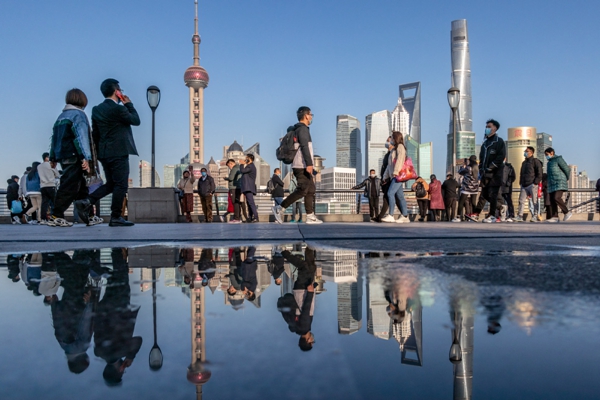Report: Shanghai most attractive city to young scientists under 30

Visitors gather in the Bund area of Shanghai. [Photo by Wang Gang/For China Daily]
Shanghai has become the most attractive city in the world to young scientists under 30 years old, a report released during the 2021 Pujiang Innovation Forum in Shanghai stated.
In terms of attractiveness to global young scientists, Shanghai topped Chinese cities and was ranked fourth among 20 global innovative cities, including New York, London and Tokyo, according to the 2021 Ideal City – Global Young Scientists Survey Report by the Shanghai Institute of Science and Springer Nature Group.
China is fast becoming the first choice for young scientists from Europe and the United States to develop their careers overseas. Chinese cities are accelerating efforts to become a good platform for the growth and development of young scientists, the report said.
The results were based on a statistical analysis of more than 20,000 scientific research papers by young scientists and a questionnaire survey of thousands of such professionals around the world.
Young scientists are widely recognized as the most active group of scientists with the strongest entrepreneurial willingness and the key to future development. Statistics showed that the average age at which Nobel Prize-winning scientists made groundbreaking achievements is between 37 and 40 years old.
The report showed that since 2012, the ranking of per capita academic contribution of young scientists in Chinese cities such as Beijing, Shanghai and Shenzhen has risen rapidly. For example, the growth rate of young scientists in Shanghai was ranked sixth in the world, with the impact factor of their papers increasing by 304.4 percent over the past three years.
Wang Xueying from the Shanghai Institute of Science for Science, one of the main persons in charge of the report, said that although the report did not track the reasons behind the data trends, the accelerated development of young scientists in Chinese cities is obviously closely related to China's increasing value and investment to scientific and technological innovation in recent years.
The survey showed that in the past nine years, 60 percent of young European scholars willing to develop their careers overseas have chosen China, and nearly one-third of young scholars who have traveled from North America to the Asia-Pacific region have come to China.
Stable scientific research funding support, high-level scientific research institutions, and opportunities to independently undertake research projects are the common aspirations of young scientists around the world and the most important factors recognized by the interviewees of the report.
The Center for Excellence in Molecular Plant Sciences of the Chinese Academy of Sciences in Shanghai is like a microcosm of this phenomenon. Spanish female doctor Rosa Lozano-Duran came to Shanghai in 2015 and formed a team at the center from scratch. In just five years, she published high-level papers in the top international academic journal Cell. At present, the center has attracted outstanding young scientists from Canada, Greece, South Korea and other countries.
What is the "ideal city" of technological innovation in the eyes of young scientists? The report showed that the critical elements include the city's ability to provide scientific researchers with reasonable living costs and good public services, world-class universities and scientific research institutions, active support for technological innovation from local government, and tolerance to diverse ethnic groups and cultures.
Shanghai has received high scores from global young scientists in these areas, especially in government support which was ranked first out of the 20 cities.
From the point of view of interviewees, "technology" and "entrepreneurship" are the keywords that best reflect the characteristics of Shanghai. At the same time, Shanghai also embodies distinctive urban characteristics such as diversification, internationalization, innovation and opportunities. For the young scientists, Shanghai has become a place of diversified development and a capital of technological entrepreneurship.
Compared with young scientists from other countries, young scientists from Chinese cities are more inclined to participate in science and technology entrepreneurship. Among them, young scholars in Shanghai show the strongest entrepreneurial enthusiasm, and the proportion of people who choose to participate in science and technology entrepreneurship and investment reached 17.07 percent, equivalent to one out of six people taking entrepreneurship as their career development direction.
In addition, the report also found that moving between different cities and academic institutions is conducive to the growth of young scientists.

 Print
Print Mail
Mail




